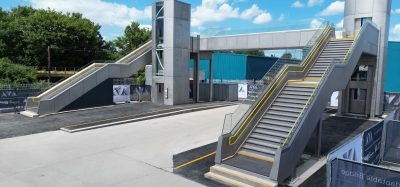Poland: Waiting for Pendolino trains
Posted: 4 June 2014 | | No comments yet
The manager of the Polish state-owned railway infrastructure – PKP Polskie Linie Kolejowe S.A. (PLK S.A.) – is implementing the largest investment programme in its history; its value, between 2012 and 2015, will amount to over €6 billion. For Global Railway Review, Piotr Malepszak – Director of the Railroads Office at PKP PLK S.A – explains that the main characteristics of this huge programme are all about the optimal utilisation of the Pendolino trains which are to roll onto Polish tracks later this year, plus important infrastructure modernisation works.
In December 2014, 20 EIC Premium trains, commonly known as Pendolinos, will commence regular services on Polish tracks. The units, purchased by the domestic operator PKP Intercity, are to link Warsaw with the largest cities: Gdańsk, Wrocław, Krakow and Katowice. The preparations for this momentous event have entered their most important phase. Dynamic tests of the Pendolinos on the network managed by PKP PLK S.A. were completed shortly before the end of 2013.
Historic moment
On 24 November 2013, a new chapter opened in the history of the Polish railways. It was on that day when a Pendolino train taking part in certification tests reached the speed of 293km/h on the Central Rail Line linking Warsaw and Katowice. Not only was it the fastest speed ever reached by trains in Poland, but also the best result ever for the Pendolino trains in general. The test rides were performed in compliance with applicable safety rules on the part of the test sectionthat was suitable for accelerating to such a speed. During thPKPe course of the tests, PKP PLK S.A. was able to verify the traction network and the new tracks, whereas PKP Energetyka examined the power supply system. The outcome of the tests showed that, in practical terms, both the train and the infrastructure are ready for regular Pendolino services on Polish tracks starting from December 2014. The experience gained during the tests will be applied at the decisive stage of preliminary work prior to launching regular services with the new trains.
Preparatory work is almost over
The current investments realised by PKP PLK S.A. in order to prepare its infrastructure for launching regular services with EIC Premium trains are in progress on three main parts of the network: on the E65 line between Tricity and Warsaw; on the Central Rail Line between Katowice and Krakow; and on the so-called Koniecpol link – the railway lines that are to create a connection between Warsaw and Wrocław. On the first of the aforementioned sections, work has nearly been completed. What remains to be done is the last part of the line between Malbork and Iława. Moreover, modernisation of this line comprises construction of a few missing engineering structures which will contribute to the elimination of level crossings. This, in turn, will make it possible to augment the maximum speed on the line to 160km/h. Thanks to all this, in December 2015 EIC Premium trains will be able to cover the route from Warsaw to Gdańsk in approximately 3 hours. In subsequent years, once the ETCS Level 2 system is commissioned, the maximum speed on this route will increase to 200km/h, which will result in a further reduction in travel time.
200km/h on the Central Rail Line
Work on the Central Rail Line focuses on the modification of engineering structures. By December 2014, a few dozen viaducts, culvert, bridges and level crossings will have been adapted to the needs of the Pendolino trains. Before regular EIC Premium services are launched on the Central Rail Line, track grinding and tamping need to be performed. Other key work necessary for Pendolino services to commence will be performed also by PKP Energetyka, which is in charge of modernising the line power supply system. These efforts will help the operator make the best use of the Pendolino’s potential as well as to increase the maximum speed to 200km/h. Based on the experiences gained while running the trains at this speed, in the years to come they may gradually start to travel even faster. However, in December 2014, the passengers will enjoy tangible benefits of the work currently in progress. An EIC Premium train will take us from Warsaw to Katowice and Krakow (approximately 300km) in less than 2.5 hours.
Only 3.5 hours to Wrocław
The coming months will see yet another breakthrough in terms of railway services on the Warsaw–Wrocław route. Currently, it takes well over 5 hours to cover it by train. In December 2014, the Pendolino trains will take you from one of these agglomerations to the other much quicker. This will happen due to the results of the work currently being done on the Central Rail Line, as well as due to the investments being implemented on the Opole–Wrocław line and revitalisation of two parts of the line between Włoszczowa and Opole. Work under this project will comprise in total the overhaul of nearly 160km of railway lines with the objective being a travel time of less than 4 hours on the Warsaw–Wrocław route, and 3.5 hours in the future.
Busy year
The investments being realised during 2014 by PKP PLK S.A. go beyond the future Pendolino routes. In fact, they cover nearly all transport corridors in Poland. Work has already started on, amongst others, modernisation of Rail Baltica. Moreover, the projects commenced in previous years will be continued. This pertains to, for example, modernisation of tracks on the section from Krakow to Rzeszów, the railway line from Wrocław to Poznań, or from Warsaw to Łódź. The total value of the investment programme implemented by PKP PLK S.A. in 2012-2015 is over €6 billion. Just for 2014 alone, the outlays on the modernisation of railway infrastructure will be almost €2 billion, which will make it possible to commission 1,500km of upgraded tracks. Effective spending of such enormous sums was facilitated by introducing new standards of railway investment implementation. A prelude to changes in the investment processes was an audit and risk assessment performed for all infrastructure projects ordered by the company. The process ended in March 2013. Its outcome was a repair process which is a prerequisite for successful implementation of the planned investment undertakings.
Risk management
One of the main tasks delegated to PKP PLK S.A. units by the Management Board in 2013 was the introduction of a new investment risk management policy. As a result, a specialist Project Management Office was established within the company’s structures, whose goal is on-going project monitoring. It is also responsible for supervising the plans of actions aimed at reducing the risk pertaining to the projects that are being realised and monitored by the management. The improved efficiency of the investment plan implementation was also due to, amongst others, greater involvement of the teams in optimising the process of procuring administrative decisions, stricter control via on-site monitoring, as well as due to implementing a short- and medium-term system of forecasting the demand for strategic materials (rails, turnouts, breakstone etc.).
The right conclusions
PKP PLK S.A. has learnt its lesson from the problems with the implementation of large-scale infrastructure investments in other industries. For this reason a package of new tender regulations was developed which will be of special importance in ensuring effective investment implementation under the new EU perspective for 2014-2020. The key changes that should be mentioned here are the contractors’ obligations to present a detailed investment implementation schedule. Such a schedule, aside from giving milestones and partial tasks, should also specify equipment and personnel assets that the contractor will deploy in a given project realisation phase; moreover, it must also provide data on financial guarantees for the project. For these reasons, the schedule has become the basic tool for cooperation with contractors. It allows for very careful management of the investment projects.
Search for the best contractors
To meet the expectations of its contractors, PKP PLK S.A. simplified the procedure of granting contractual advance payments as well as introduced a regulation allowing for inclusion into the new contracts of permits for making payments towards the contractors for incomplete work, namely the so-called ‘partial’ payments. At the same time, the infrastructure manager announced strict application of contractual penalties if the deadlines indicated in the schedule for specific investment phases are not met, or if the schedule is not kept up-to-date. Also the method of selecting infrastructure investment contractors has been changed. With respect to its most important investments, PKP PLK S.A. will use two-stage tenders. At the first stage, the bidders will be analysed with regard to their experience and performance potential, whilst at the second stage – the best of them will be invited to take part in financial negotiations. This procedure should help reduce the impact of the lowest price criterion as the main one in selecting investment contractors.
Investment projects will be completed faster
All these modifications should result in a maximum utilisation of EU funding under the current EU budget perspective; however, they will also guarantee effective implementation of the investment process in 2014-2020. The amount of €10.5 billion, which is nearly PLN 44 billion, is to be spent on rail transport in this period. Because of that, PKP PLK S.A. developed the Domestic Railway Programme (a programme document for the 2014-2020 financial perspective) which includes investment projects worth in total PLN 58.6 billion. Moreover, the infrastructure manager will apply for the means under EU’s new financial facility – ‘Connecting Europe Facility (CEF)’. In 2013, a long-term programme of railway investments was developed for the projects submitted for the CEF competition in 2014. In compliance with it, as part of the first call for applications for the aforementioned facility, PKP PLK S.A. will file five comprehensively prepared projects worth in total PLN 8 billion. It means that in subsequent years, the investments of PKP PLK S.A. will not only be far from slowing down, but in fact they will markedly accelerate.
Biography
Since August 2008, Piotr Malepszak has been professionally connected with PKP Polish Railway Lines SA, initially as a specialist in the Office for High-Speed Rail, and now currently as the Director of the Office of Rail Roads and Plenipotentiary of the Board for the revitalisation of railway lines. Piotr is co-author of the first programme of the revitalisation of the Polish railway network and is the author of the concept of improving the technical parameters of the railway infrastructure, among others, by better matching the range of investments for infrastructure needs. Piotr currently coordinates the work associated with key investments within PKP Polish Railway Lines SA, including projects involving Pendolino.







